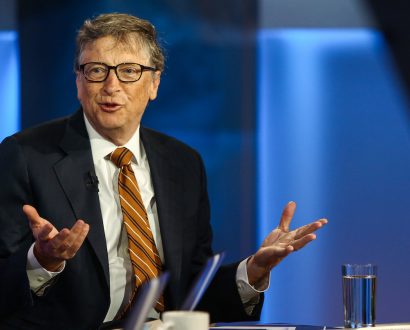Bill Gates reveals 5 ways we can end the global health pandemic

If leaders had listened to Bill Gates during his insightful TED Talk back in 2015 when he warned of an infectious disease that would kill millions of people, the coronavirus pandemic we’re living through may never have got this far.
Five months after the first COVID-19 outbreak in Wuhan, China, Gates has shared his views on the health crisis as many countries enter the second phase of the fight against the deadly virus.
The Microsoft co-founder published a report Pandemic I: The First Modern Pandemic through his blog GatesNotes explaining the effects of coronavirus will be felt for a long time yet.
The philanthropist believes "the first modern pandemic" will define our generation just as the world wars shaped the generations before. His insights also provides key lessons on how to end the pandemic.
"During WWII, an amazing amount of innovation, including radar, reliable torpedoes and code breaking, helped end the war faster," Gates wrote. "This will be the same with the pandemic.
"I break the innovation into five categories: treatments, vaccines, testing, contact tracing and policies for opening up.
"It is impossible to defeat an enemy we cannot see. So testing is critical to getting the disease under control and beginning to reopen the economy.
"Every additional month that it takes to get the vaccine is a month when the economy cannot return to normal."
Additionally, raising money to be used for lifesaving tools is paramount, with Gates’ goal being to raise billions to save trillions.
"It is impossible to defeat an enemy we cannot see. So testing is critical to getting the disease under control and beginning to reopen the economy." – Bill Gates
The Bill & Melinda Gates Foundation, which was founded by Gates’ and his wife Melinda in 2000, has committed more than US$250 million to the COVID-19 response.
"At its best, philanthropy can take risks that governments can’t, and corporations won’t," Bill & Melinda Gates Foundation CEO Mark Suzman says. "In this way, philanthropy doesn’t supplant the public and private sectors, it supports them.
"Our bottom line is lives saved."
As leading scientists and health professionals work to establish a vaccine and battle the virus on the front line, the tech-savvy billionaire explained the next phase of living through a pandemic would involve "opening up".
For developed countries, life could return to a "semi-normal" environment in the next two months.
"People can go out, but not as often, and not to crowded places," Gates wrote. "Picture restaurants that only seat people at every other table, and airplanes where every middle seat is empty.
"Schools are open, but you can’t fill a stadium with 70,000 people. People are working some and spending some of their earnings, but not as much as they were before the pandemic.
"In short, times are abnormal but not as abnormal during the first phase."
The billionaire also believes the key to keeping the virus under control is by gradually changing everyday life, monitoring every stage in every country.
"At its best, philanthropy can take risks that governments can’t, and corporations won’t." – Mark Suzman
The blog comes five years after Gates first warned the world about the deadly effects of an epidemic during a TEDTalk appropriately called The next outbreak? We’re not ready.
"If anything kills over 10 million people in the next few decades, it’s most likely to be a highly infectious virus rather than a war," he said. "Not missiles, but microbes.
"Part of the reason for this is that we’ve invest a huge amount in nuclear deterrents. But we’ve actually invested very little in a system to stop an epidemic. We’re not ready for the next epidemic."